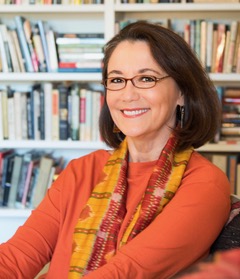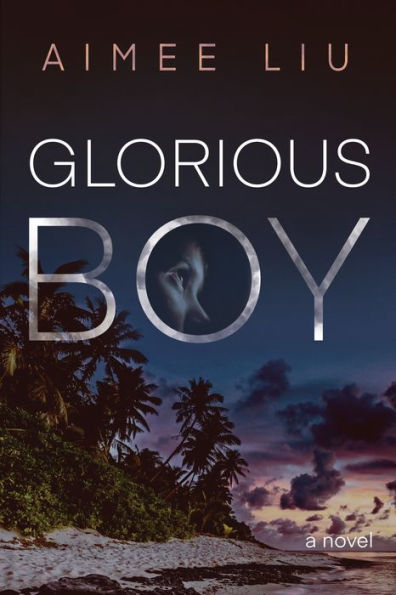Yellowface in the Family
I was cleaning out my father’s office after his death when I discovered the history of his movie years, stuffed into a soft red and gold Moroccan leather folio. This trove of yellowing newspaper clippings and gauzy headshots thrilled me. Here at last was the archive that would help me piece together Dad’s unlikely acting career 70 years earlier.
He’d never wanted to talk about his Hollywood days. MGM’s 1937 version of The Good Earth was the only movie he’d admit to being part of, which was odd because he hadn’t even made the final cut. His appearance as one of the uncles in the opening scene wound up on the editing room floor. He also worked as a technical consultant for the crews that shot in China. Dad had grown up in Shanghai, the son of a Chinese official who’d remained in Nanking after Dad’s American mother moved the rest of the family to California. My father doubtless was very useful to the production, given the various wars and political intrigues that were brewing in China at the time, but this role, too, was uncredited.
Not until late in his life, just a few years before he died, did I learn that both Dad and his sister Lotus performed onscreen with some of the biggest movie stars of the 1930s. On an idle whim, my brother had searched for their names on IMDb. According to his listed credits, our father, Maurice Liu, played the Hawaiian bridegroom in Waikiki Wedding, starring Bing Crosby. In Shadow of Chinatown, a Bela Lugosi vehicle, Dad appeared as a house boy. In West of Shanghai, with Boris Karloff, he was listed as a train conductor. Lotus had nine films under her name.
My brother immediately ordered copies of Dad’s movies, and the next time I visited my parents in Connecticut, we all gathered for a family screening. My father smiled indulgently as if we were making much ado about nothing. He offered no reminiscences, but accepted his seat of honor up front, grandchildren scattered around him. Still remarkably youthful at 90, with a full head of silver hair and adamant posture, he stared at the screen with an air of resignation.
We started with Waikiki Wedding, which opened at a beachfront altar, my father, the bridegroom at 24, standing tall and trim as the surrounding palm trees and so darkly handsome that he looked polished, so perfectly composed that he seemed to be operating under some kind of spell. Eyes fixed on a pretend horizon, he reminded me of a cliché version of Hiawatha. When he started to talk, we all cheered so loudly that I couldn’t make out the words of his earnest ode to love, but I did notice his familiar delivery. Schooled by the British in Shanghai, Dad spoke with an English accent more suited to Harrod’s than Hawaii. He also seemed to think he was reciting poetry rather than opening a musical rom-com.
Then Bing Crosby strolled into frame, jauntily stealing the scene — and the rest of the movie. But that was to be expected. After all, there was nothing truly Hawaiian about this production, which was shot on a Paramount sound stage and featured Anthony Quinn as one of Dad’s fellow “natives.” To pull this off, Quinn had to wear the synthetic makeup called yellowface, which was first devised by makeup artist Jack Dawn so that Caucasian stars could play the lead roles as Chinese in The Good Earth.
My brother ejected the tape, and three generations of my family whistled and applauded. My father winced and waved us off, dismissing his dazzling younger self, offering zero gossip about the stars who’d upstaged him, or their offscreen hijinks.
Next, my brother cued up Shadow of Chinatown as Dad stared out the window. The day’s fading light deepened the pouches beneath his eyes, making him look exhausted and sad. I tried to imagine the memories he’d silenced for so long. Dad had always been an enigma to us. Now I began to see why.
As the monochrome footage began to play, Bela Lugosi, elsewhere known as Count Dracula, loomed across the screen as a Eurasian villain. I stole a glance at my father. He still had his face turned to the window. In Shanghai, he’d been classified as Eurasian. As a little boy, he’d been required to attend separate schools. He and his three siblings were bullied by the British and shunned by wealthy Chinese. Lugosi’s character, ostensibly tormented because of similar treatment, announced his intention to destroy San Francisco’s Chinatown in revenge.
My father, however, had been cast as Willy Fu, the loyal and inscrutable Chinese servant of the wisecracking mystery writer (White, of course), who thwarts Lugosi in the end. Even setting aside the cringeworthy premise of a biracial madman, and even if the script was meant to be tongue-in-cheek, Willy Fu embodied an excruciating stereotype of the sage Celestial. Hovering in the background like a servile ghost, he tossed out one florid Orientalism after another. When one of the bad guys pointed a gun at him, the unflappable Willy Fu intoned, “I accede to honorable request of thug.” Straight out of Charlie Chan (another yellowface vehicle), such lines demanded the stiff, slightly dazed delivery that I was starting to recognize as my young father’s specialty.
We were fast-forwarding through the movie, skipping the low-budget action takes and Lugosi’s hypnotic stares, when I realized Dad had left the room. The grandkids had lost interest, too, so we aborted the screening after a quick glimpse of my father uniformed as a train conductor in West of Shanghai, sliding open a compartment door and asking Boris Karloff, in yellowface as a menacing Chinese warlord, for his ticket.
Dad didn’t come back for that last clip. Afterward, he shrugged off our questions, and he refused to watch his performances ever again.
At the time, I thought age could have something to do with his resistance. Vanity can make it painful for the elderly to revisit their younger, more beautiful selves. But Dad’s response suggested a deeper mortification, which I only fully grasped when I unpacked that folio after he died.
One set of clippings consisted of reviews like this one, from the Hollywood Citizen-News, 1936:
Maurice Liu, playing Wang Lung worshipper of the land, injected life into the monologic [sic] version of “The Good Earth” to win three thunderous curtain calls… Intermingled with plain folk, the royalty [in the audience] included such princesses of the celluloid as Janet Gaynor, Frances Dee, Ginger Rogers, Carol Hughes, and Wendie Barrie, such grease-paint knights as Lew Ayres, Joel McCrea, and Regis Toomey…
Evidently, Dad’s staged one-man version of The Good Earth was no typical student production. The audience at USC that night included some of the biggest “movie moguls” of the day, including the great Louis B. Mayer himself. Dad’s college drama coach must have been beside herself when these luminaries cheered for her protégé. Mayer and company, at the time, were still casting MGM’s production of The Good Earth.
This posed a special challenge for the studio because every character in Pearl Buck’s original story was Chinese. Buck, who’d won the 1931 Pulitzer Prize for The Good Earth, wanted all these roles to go to Chinese or Chinese American actors. So, initially, did producer Irving Thalberg. The coterie of Asian actors who were friends of my father all thought their time had come.

Like many of the others, Dad got a screen test. But the contents of the folio suggested that for once in his life, he didn’t look Chinese enough. Along with the rave reviews of Dad’s one-act, a sheaf of black and white photographs documented Dad’s makeover for the part. He had to wear yellowface.
The pictures read like before, during, and after photos of plastic surgery. In one image, the resin bulges across Dad’s forehead. In the next, it covers his hairline, thickens his cheekbones, and hoods his eyes. As the series advances, X’s mark the patches of vinyl that need to be tightened or filled. My father’s eyes narrow until he’s unrecognizable.
A wig is attached at his plastic crown, the black hair lying tight as it pulls back into the Chinese pigtail that signals subservience. The photographer has draped this false queue over the costume robe. Dad tucks his fists inside his sleeves. He gazes straight into the lens, his features deadened. Leading inexorably to a cartoon image on the cutting room floor, the series is a cinematic metaphor for losing face.
No wonder Dad’s subsequent performances were stiff, tortured, unbelievable. Even when liberated from this synthetic masking, he was still typecast as an ornamental cliché. Exotic window dressing or kowtowing servant, what was the difference?

But Dad wasn’t the only subject of the folio clippings. His younger sister, it seemed, had been subjected to a different and, in ways, even more insulting Hollywood ride.
According to the San Antonio Express, my aunt Lotus’ movie career began in 1936 with a phenomenally lucky break:
Her name is Lotus Liu and she will play Lotus, the Soochow sing-song girl and home-wrecker, in Metro-Goldwyn-Mayer’s “The Good Earth”. The 19-year-old unknown is the only China-born principal in a cast headed by Paul Muni (Austria) and Luise Rainer (Germany)
Oriental in appearance, pleasantly English in accent, Lotus is strictly American in aspirations. Arriving here two years ago as a student, she probably would be fluttering masculine hearts on Southern California campuses if M-G-M’s astute Billy Grady hadn’t glimpsed her one afternoon waiting for a bus.
Since then, everything has been easy for Lotus. Though the studio tested thousands of girls for the part — American and European, as well as Chinese and Eurasian — her youth and vitality won the battle.
It’s a break of a lifetime, this part, and Lotus knows it. Talking nineteen to the dozen, the other afternoon on the “Good Earth” set, she looked like one of the better college freshman in her military-minded gray suit and absurd scarlet handkerchief perched on her black curls. But her ambitions are adult. China’s famous passiveness is conspicuously absent.
Anna May Wong had turned down the role of Lotus, “the sing-song girl and home-wrecker,” because it was “the only unsympathetic role in the picture.” My aunt didn’t have Wong’s marquee value, however, much less her scruples. Our Lotus was elated to be cast as “the only China-born principal” in this star-studded production.
The celebration didn’t last long. MGM soon persuaded Thalberg that it would be box office suicide to cast any Asians in starring roles — including my half-Chinese aunt. Just a few weeks after she was cast, the studio announced that she’d been replaced by a New York dressmaker turned actress named Sidney Fox.
Not long after that, Fox, who was destined to die of an overdose of sleeping pills just a few years later, was fired and Lotus briefly reinstated. Then the role was given to an Austrian dancer named Tilly Losch.
Though Losch in yellowface could visually pass for Chinese, her thick German accent was another matter. Yet again, the studio called my aunt back, this time to dub the lines that originally had been her own. As a booby prize, Lotus Liu was allowed to appear for about 10 seconds as an unnamed sing-song girl strumming her mandolin and tilting her head coquettishly. At least this token made The Good Earth’s final cut.
My father’s Hollywood “career” lasted two years, my aunt Lotus’ four. By the end of the 1930s, Orientalism was on the wane. World War II was fast approaching, with Japan cast as the enemy. Geopolitically, China was our ally, but since all Asians looked alike to most White Americans, the roles evaporated for actors of Chinese, as well as Japanese, descent.
My aunt then demonstrated her indomitable “youth and vitality” by launching a company that manufactured shoulder pads, the reigning fashion craze, for women’s suits. She married the heir to a blue-chip fortune, then an Academy Award-winning screenwriter, and finally a vice president of American Airlines. She spent the rest of her life living in a house that Dick Powell and Joan Blondell had built atop the Hollywood Hills. Like my father, she never talked much about her movie career, but the glamour shot of her in her prime, lithe in a cheongsam, lotus flower in her hair, watched over her until she died, well into her nineties.

As for Dad, the folio gave me one final clue into his transformation from cinematic casualty into the father I knew. Along with the yellowface photos, he kept about a dozen other studio shots. There he was, done up as a pirate, a gypsy, a Bolshevik spy. He looked ridiculous, one affect more preposterous than the next, until suddenly the silliness vanished.
In the folio’s final photograph, Dad looked not just natural, but as impeccable as Cary Grant. Dark hair coaxed into a wave. Windsor-knotted tie neat against a starched white shirt. The lapels of his smart black suit jacket flared, and a folded white handkerchief winked from his pocket. With a smile just deep enough to exercise his dimple, this is the image my father would wear like a second skin during his long career as an executive. This is the dad I grew up with.
And while the “Eurasian” features on full display here may not have served him well on the silver screen, they looked just right at the United Nations, where he ultimately made his real career. Yellowface be damned.



